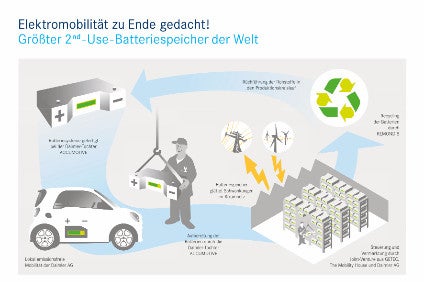
The world’s largest second-use battery storage, a 13MWh project, is now nearing completion after construction time of just under a year: 1,000 battery systems from second generation Daimler Smart Fortwo electric cars are being grouped in Lünen, Westphalia.
The first power units are already in the grid and full capacity will be at the disposal of the German energy market before the end of the year. Output will be available to the winner of the weekly auctions among the network operators for primary controlling power range with fully automatic energy storage and feed-in.

Discover B2B Marketing That Performs
Combine business intelligence and editorial excellence to reach engaged professionals across 36 leading media platforms.
As energy is increasingly fed in from fluctuating, renewable energy sources such as wind farms or solar power stations, high-capacity battery storages are the key to stabilising power networks. According to the German Ministry for the Economy and Energy (BMWi), 40 to 45% of power consumed in Germany is to be generated from renewable resources by 2025, increasing to 55 to 60% by 2035.
The joint venture between Daimler, The Mobility House and GETEC answers the key question of reusing electric vehicle battery systems with this second-use battery storage because the lifecycle of a plug-in or electric vehicle battery does not end after the vehicle’s operating life. If used in stationary power storage, the systems are fully operational even after the service life guaranteed by the manufacturer – with slight capacity losses only of secondary importance. Cost-effective use in stationary operation is possible for at least an estimated 10 years longer. Reusing the modules from electric cars in a battery storage doubles their economic value and also demonstrably improves their eco-balance.
With the project in Lünen, the four partner companies cover the entire battery added value and second-use chain: from the manufacture and configuration of the battery systems by Daimler subsidiary Accumotive and the corresponding range of electric and plug-in hybrid vehicles from Daimler to the installation and marketing of the stationary battery storage to the energy markets by The Mobility House and GETEC and, finally, the recycling of these battery systems at the end of their lifecycle and the return of the valuable raw materials to the production cycle, which will be the remit of Remondis.
Project partners
Daimler through subsidiary companies Accumotive and Mercedes-Benz Energy is active in the automotive and stationary battery sectors – both for industrial mass energy storage and in the private customer business.
The Mobility House uses innovative technologies to allow the integration of electric vehicles into the power grid and is installing and operating the battery storage in Lünen together with GETEC – and sells the energy to the energy markets. TMH was founded in 2009, and cooperates with all leading automobile manufacturers in over 10 countries from its locations in Munich, Zurich and San Francisco.
GETEC is an energy services provider active throughout Europe.
Remondis is one of the world’s largest service providers for recycling and water with a project in place to recycle lithium-ion batteries on an industrial scale in future.






